I taught my first college course in the humanities in June 2010. Over the years I’ve learned that many people don’t really know what the humanities are before entering a humanities’ college classroom. I’ve also learned that this lack of knowledge doesn’t stop most people from concluding that the humanities are a waste of time.
This is a sentiment I can actually relate to. I recall being a community college student begrudgingly taking a humanities survey course and an ethics course, frustrated that I was being sidetracked from my preferred course of study in film. (That's right, I did not realize the relevance of the humanities to film.)
The wisdom of loving our enemies is revealed when we discover that much of what our enemies hate about us is based on prejudice and ignorance.
One of the chief lessons the humanities teach us is the folly of judging something before you understand it. The humanities is a field of study that, in a Jesus-like fashion, loves everyone including those who are, at the onset, its enemies, or at least those who are rather hostile to it. The wisdom of loving our enemies is revealed when we discover that much of what our enemies hate about us is based on prejudice and ignorance. For the humanities this is a principle with epistemological value as well as ethical value. An open mind not only humanizes others, it also enables us to gain knowledge that, at first glance, may discomfort us.
In my experience many of those who learn what the humanities are about and what they enable us to understand are quickly converted from passive enemies to vocal supporters. This includes many majoring in health science, biological science, technology, and mathematics. I’ve had more than a few university engineering students remark that their experience with humanities was, well, humanizing; that it allowed them to think in a more reflective manner and facilitated contemplation of direct and fundamental matters of concern: their personal development, their relationships, their values, their purpose.
Students particularly appreciate the humanities' direct engagement with the most challenging, controversial matters in human experience: questions of purpose, values, morality, spirituality, creativity, beauty, love, and justice. They also appreciate the humanities’ embrace of the democratic principle of freedom of thought and expression. In humanistic learning environments, we openly and freely discuss a range of perspectives and experiences related to these questions, including those many of us may find discomforting or seriously flawed.
Uninspired Schooling
My path to becoming a college professor is a bit different from many in academia. At best, I was a mediocre student throughout my youth, and dropped out of high school in my senior year. Thirteen years later I earned a doctorate in Comparative Studies from Florida Atlantic University and a Master of Liberal Studies and BA in Humanities from Rollins College before that. Dropping out of high school, for me, was one of my earliest experiences of autonomy. My decision led to a significant shift in thinking about was possible and permissible. Through this act of will I was emboldened to creatively revaluate my capabilities and identity. Much of my schooling experience, up to that point, was tedious, lifeless, automated, narrowly conceived, and detached from living. It was something I merely resigned myself to.
I would later learn that I was not alone in my criticism of conventional schooling. In Compulsory Mis-education (1964), public intellectual, Paul Goodman, argued that U.S. schools failed as sites for “socialization and democratization” because they had “gone much too far toward regimentation.” The growing emphasis on competitive grading and testing was, in his mind, generating an “educational calamity,” moving us further away from the foremost humanistic goals of education. Goodman wrote,
“The hard task of education is to liberate and strengthen a youth’s initiative, and at the same time to see to it that he knows what is necessary to cope with the on-going activities and culture of society, so that his initiative can be relevant. It is absurd to think that this task can be accomplished by so much sitting in a box facing front, manipulating symbols at the direction of distant administrators. This is rather a way to regiment and brainwash.”
Against the claim that schools are generally spaces where we develop our unique capabilities and to think independently, Paul Goodman argued that schools tended to foster cultivate conformism and political and social passivity.
“It is in the schools and from the mass media, rather than at home or from their friends, that the mass of our citizens in all classes learn that life is inevitably routine, depersonalized, venally graded; that it is best to toe the mark and shut up; that there is no place for spontaneity…and free spirit. Trained in the schools they go on to the same quality of jobs, culture and politics. This is education, miseducation socializing to the national norms and regimenting to the nation's 'needs.’”
I was surprised to learned that Goodman’s critical perspective, though marginalized, was not unique. His analysis echoed and built on many criticisms authored before him by figures including Ralph Waldo Emerson, Henry David Thoreau, Tolstoy, Emma Goldman, Mark Twain, Jack London, Upton Sinclair, A. S. Neil, Maria Montessori, Bertrand Russell, Albert Einstein, Elizabeth and Alexis Ferm, and Erich Fromm. These criticisms were further developed into the 1960s and 1970s by thinkers like Ivan Illich, Paulo Freire, John Holt, Charles Silberman, and Joel Spring.
A reoccurring criticism of conventional schooling is perhaps best expressed in Erich Fromm’s book, Escape From Freedom (1941). He contends schools too often prioritize the accumulation of information over independent, critical thinking.
“I want to mention briefly some of the educational methods used today which in effect further discourage original thinking. One is the emphasis on knowledge of facts, or I should rather say on information. The pathetic superstition prevails that by knowing more and more facts one arrives at knowledge of reality. Hundreds of scattered and unrelated facts are dumped into the heads of students; their time and energy are taken up by learning more and more facts so that there is little left for thinking. To be sure, thinking without a knowledge of facts remains empty and fictitious; but ‘information’ alone can be just as much an obstacle to thinking as the lack of it.”
A complete education would put significant emphasis on nurturing students’ capacity and inclination to reason and think critically.
What do you think about Fromm’s critique of the emphasis on acquiring information over original, critical thinking? Do you agree with his objection? Is this critique still relevant to contemporary schooling systems?
More recent critics like
, Henry Giroux, bell hooks, Noam Chomsky, Howard Gardner, and Kenneth Robinson have questioned the way we go about schooling children while also affirming the democratic principle that all children should have opportunities to develop their intellectual and creative potential in socially-supported programs. They criticize the lack of emphasis on and exemplification of democratic principles along with the didactic, mechanistic way schooling is organized and administered. Too often schooling undermines students’ flourishing, alienates them from their natural creative and intellectual abilities, numbs their natural passion for learning, and reinforces anti-democratic values and interpersonal relations. These thinkers point out that schooling can be done differently.Discovering Humanistic Inquiry
My relationship with formal education changed when, after passing the General Educational Development (GED) test, I enrolled in what was then Miami Dade Community College and encountered philosophy in my first year. The radically open and imaginative yet temperate exchange of ideas was electric. The environment exemplified a “love of wisdom” I had rarely encountered in formal educational settings. While I was lucky to grow up in a family where questioning and debate were normal, the philosophy classroom, in particular, was different.
The aim of the philosophical classroom wasn’t cheap victory—pot shots and drive-by zingers. The aim was understanding, exploration, and a disciplined pursuit of knowledge.
Unasked questions were articulated; discouraged opinions were brought into open dialogue and considered; uncomfortable contradictions were highlighted; and the beauty of creative, critical introspection was unshackled from conventional, common sensical expectations. Virtually nothing was taken for granted as “self-evident.” A range of political-moral beliefs were equally scrutinized. Methods of knowing were themselves interrogated.
Yes, religious beliefs were critically examined, but so were arguments against the existence of God, not to mention the principle of universal causation upon which the entire field of science rests. There was a lot of listening and diverse perspectives were given ample space to stretch out to their fullest development. The aim of the philosophical classroom wasn’t cheap victory—pot shots and drive-by zingers. The aim was understanding, exploration, and a disciplined pursuit of knowledge.
The atmosphere of the philosophy classroom was one that thoroughly understood the intrinsic and extrinsic value of freedom of thought and expression. The open exchange of ideas was something I would later learn was elemental to the field of the humanities and most courses in the liberal arts.
Humanities and Freedom of Expression
The humanities’ value extends beyond the “content” of knowledge contained in the various areas of study—philosophy, religion, history, art, language, etc.—that comprises the field. The humanities’ value has a lot to do with its fundamental commitment to freedom of expression and dialogue as a way of honoring and affirming human dignity—something that is good in itself—and as a method of producing creativity and generating new knowledge.
The English philosopher John Stuart Mill’s eloquent and robust defense of freedom of expression, in On Liberty (1859), exemplifies the very spirit of inquiry and social and self examination that defines the humanities. Mill’s work teaches us the fundamental lesson that we cannot truly know the beliefs we claim to treasure if we do not know the competing arguments offered against our own. As Mill wrote,
“He who knows only his own side of the case, knows little of that. His reasons may be good, and no one may have been able to refute him. But if he is equally unable to refute the reasons on the opposite side; if he does not so much as know what they are, he has no ground for preferring either opinion.”
One of the reasons Mill argued we should not silence objectionable views is that doing so presumes our infallibility since the only way to prove the inaccuracy of an idea or claim is to hear it out and engage the idea and those advocating for it. As Mill explains,
“There is the greatest difference between presuming an opinion to be true, because, with every opportunity for contesting it, it has not been refuted, and assuming its truth for the purpose of not permitting its refutation. Complete liberty of contradicting and disproving our opinion, is the very condition which justifies us in assuming its truth for purposes of action; and on no other terms can a being with human faculties have any rational assurance of being right.”
We cannot, for example, reasonably condemn something that we are ignorant of since a rational condemnation requires knowledge of what we condemn.
Another reason Mill objected to silencing views we disagree with is that few beliefs were entirely right or entirely wrong. Many deeply flawed ideas and arguments possess some partial truth—some seed of insight—that we would benefit from unearthing and contemplating. Mill writes:
“Popular opinions, on subjects not palpable to sense, are often true, but seldom or never the whole truth. They are part of the truth; sometimes a greater, sometimes a smaller part, but exaggerated, distorted, and disjoined from the truths by which they ought to be accompanied and limited.”
We lose access to these partial truths when we silence such expression of beliefs. What’s more, in silencing such views we advance a flawed linear conception of how human knowledge and understanding progresses. A conception that fails to appreciate how often insight is born of error, particularly when brought out into the light of examination.
Critically engaging with views opposed to our own does more than expose potential blind-spots in our thinking. This engagement infuses vitality into our cherished beliefs and rekindles genuine relatedness with those beliefs. The inclination of so many to insulate their chosen truths from critical interrogation produces the opposite of the intended effect. We end up with hollow and perfunctory beliefs held onto out of obligation. As Mill wrote,
“however true [a strong opinion] may be, if it is not fully, frequently, and fearlessly discussed, it will be held as a dead dogma, not a living truth.”
The ongoing distortion of objectivity as passionless, detached examination of ideas and the world leads us to underestimate the importance of how we relate to or understand the truth. Mill wrote:
“the meaning of the doctrine itself will be in danger of being lost, or enfeebled, and deprived of its vital effect on the character and conduct: the dogma becoming a mere formal profession, inefficacious for good, but cumbering the ground and preventing the growth of any real and heartfelt conviction, from reason or personal experience.”
We are all inclined to a kind of “intellectual idolatry,” whereby we embrace words, slogans, and cliches. We lose connection with the fundamental understanding these symbols are meant to direct us to.
Truth loses much of its power when we treat it as a perfunctory “possession,” as something to be handed out or handed down without challenge. Mill argued that the “living apprehension of a truth” requires us to again and again engage in the critical assessment of our most cherished beliefs. When others challenge such beliefs, Mill contends we ought to make full use of the opportunity. And when a cherished belief finds too few dissenting criticisms, we should stimulate such critical analysis to maintain a healthy, vital relationship with these beliefs.
Humanistic inquiry often reinvigorates our understanding and relationship to beliefs we had numbly resigned ourselves to and inconsistently conformed to.
Nietzsche articulates the spirit of this humanistic ideal in The Gay Science (1882), written more than 30-years after On Liberty. Nietzsche compared an innovative idea to a seedling striving to be a tree. The seedling reaches maturity in the same way the idea evidences its truth: by weathering “storms, doubts, worms, and nastiness.” The ideal disciple of such truth, we read, is one willing to say,
“I believe in your cause and consider it so strong that I shall say everything, everything that I still have in my mind against it” (Book 2, no 106).
But the objective is not simply to “test” our cherished beliefs, it is also to renew their aliveness in us.
The belief that knowledge is simply “achieved” or “obtained” continues to distort our thinking about learning and education. To know implies more than to “have” the right answers, but to also understand and appreciate the relationship between our ideas, the basis of our beliefs, and their relationship to our lives.
Echoing Mill’s earlier comments, Albert Einstein explained, in “On Education” (1936) that knowledge must be continuously revitalized. When it comes to matters of human beings and society, Einstein said,
“knowledge of truth alone does not suffice; on the contrary this knowledge must continually be renewed by ceaseless effort, if it is not be lost. It resembles a statue of marble which stands in the desert and is continually threatened with burial by the shifting sand. The hands of service must ever be at work, in order that the marble continues lastingly to shine in the sun. To these serving hands mine shall also belong.”
Often the humanities classroom and humanistic inquiry, more generally, reinvigorates our understanding and relationship to beliefs we had numbly resigned ourselves to and inconsistently conformed to. Students frequently report a deeper connection to previously held ideas after they were subjected to scrutiny. We sift through the overflowing garage of our minds, rediscovering lost insights and courageously parting ways with ideas clung to out of only nostalgia, or familiarity, but also, sometimes, fear. We breathe fresh life into old ideas, examine candidates for new insight, and let go of those that undermine reason and integrity. In the process, our truths become cherished again, embraced with passionate conviction and confidence they can withstand challenge; or knowing that if they cannot withstand challenge, they may not deserve our commitment.
The humanities remind us, again and again, that being discomforted or unfamiliar with an idea, belief, or expression is not evidence that it is wrong; neither is it evidence it is right.
Treasures of the Humanities
At their best, the humanities invite us to contemplate the human condition from an array of perspectives, including those that we identify with, those that challenge us, and some that repulse us. The humanities remind us, again and again, that being discomforted or unfamiliar with an idea, belief, or expression is not evidence that it is wrong; neither is it evidence it is right. We are taught that a genuine pursuit of knowledge calls on us to embrace vulnerability, humility, and courage.
A Spring 2022 message from a former student indicates that the multifaceted positive impact the humanities have on students. She was graduating from one of the state colleges I teach at, and sent me a note about her experience in my humanities course the year before. She wrote:
“I was in one of your evening virtual humanities classes last Spring and I always looked forward to class every week. The lectures and discussions we had in class often became dinner topics. It expanded my views and helped me to consider all angles of a subject and to question things. I think the world would be a better place if everyone were to take a class like this, then maybe we would all understand each other a little better. The thought of a world where people can disagree and have a spirited debate without having to win or resort to pettiness is the world I wish for future generations. That is why humanities are so important and you made it interesting and enjoyable to learn….You created a safe space for everyone to speak their mind, even if many in my class chose not to speak at all.”
It’s no small matter for people living during such extreme political-cultural polarization to understand and honor their fellow community members, even as they directly admit and address their serious points of disagreement.
Many students in my humanities and cultural studies classes express thankfulness and excitement in finding a space where they can compare and contrast views with others, and even politely disagree, without being personally attacked and condemned without even being understood. John Stuart Mill spoke to this very point when he wrote
“there is always hope when people are forced to listen to both sides; it is when they attend only to one that errors harden into prejudices, and truth itself ceases to have the effect of truth, by being exaggerated into falsehood.”
The importance of creating such spaces and opportunities for growth and understanding cannot be underestimated. A degree of fortitude and courage is also required. As the public intellectual, bell hooks, argued, resolving deep-seated problems in society and in ourselves requires us to have difficult conversations, especially with those with whom we have the deepest disagreements. She called for us to embrace “radical openness” and reject visions of “safety” based on avoidance of controversy and conflict-free encounters with opposing views.
“The pressure to maintain a non-combative atmosphere…one in which everyone can feel safe, can actually work to silence discussion and/or completely eradicate the possibility of dialectical exchange.”
As a professor committed to engaging students in dialogue on the significant ideas, works, and cultural epochs of human history, I can directly attest to the power of free and authentic exchanges of ideas. Genuine dialogue across boundaries of ideologies, cultural differences, and upbringings inevitably introduces conflicting thoughts and feelings. Yet it also yields some of the most fruitful opportunities to develop our intellectual and ethical capabilities. Each semester students report growth in critical thinking and communication skills along with deepened self-knowledge and open-mindedness. In facilitating such dialogue I have also grown in similar ways.
Perhaps most importantly, the humanities remind us that living lives of goodness and integrity are achievements that take effort, discipline, knowledge, and inspiration.
Together, In Dialogue
The humanities beckons us to pull up a seat to the table of cultural creation. To think courageously, listen carefully, and argue with humility. We learn to critically examine beliefs, institutions, and cultural practices. Where did they come from? How were they formed? What do they teach us about ourselves? Do they enable us to flourish, or do they denigrate our humanity? The humanities force us into the blinding light of cultural difference, like the captives in Plato’s “Allegory of the Cave,” to lay claim to our intellectual autonomy and creative responsibility as culture creators as well as culture consumers.
Perhaps most importantly, the humanities remind us that living lives of goodness and integrity are achievements that take effort, discipline, knowledge, and inspiration. The humanities remind us of the folly of “going it alone,” in this project we call life. After all there is only so much an individual person living a singular life can figure out and achieve on their own. The humanities offer us a treasure-trove of resources, resources spanning millennia, for this endeavor. And they bring us together, in dialogue, with our imperfect predecessors to parse out their wisdom and ignorance; their goodness and cruelty; their achievements and failures. And as we study cultures of past and present, we also study and creatively determine who we will be.
If you found this post interesting, please share it with others and like it by clicking the heart icon. And be sure to subscribe if you haven’t already.
Invite Dr. Nall to Speak
Dr. Nall delivers energetic live presentations and engaging workshops on the subjects featured in Humanities in Revolt. Those interested in booking a workshop or talk can get in touch through Facebook or by leaving a comment.




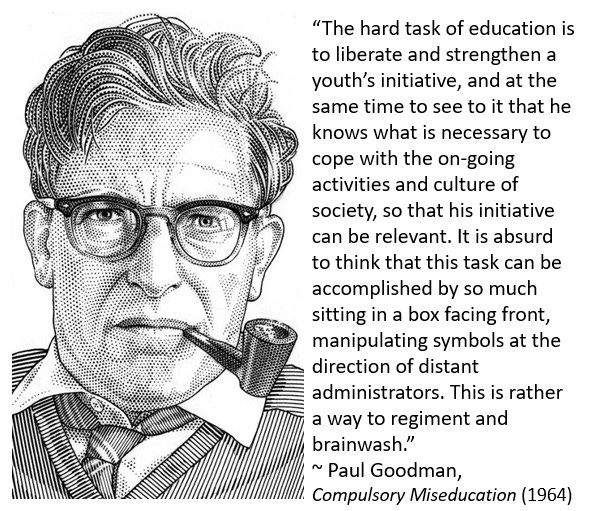
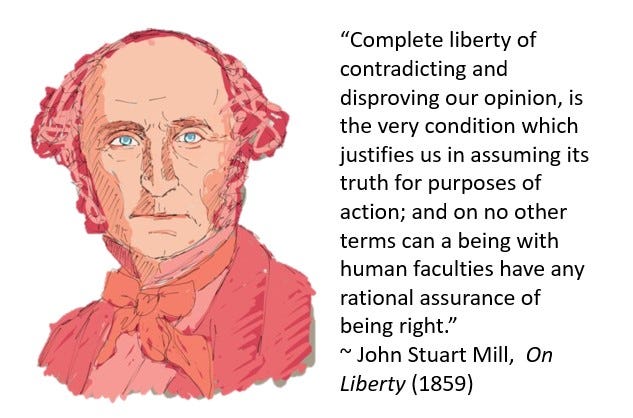

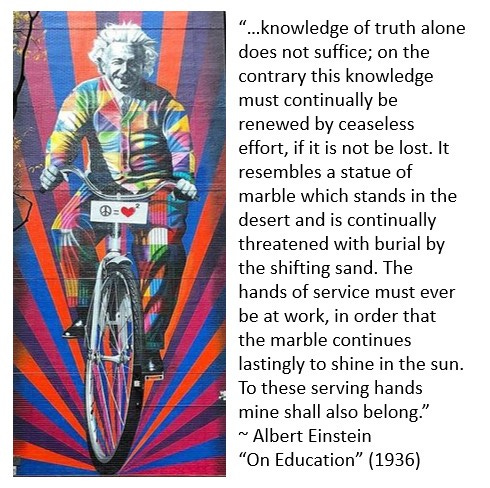
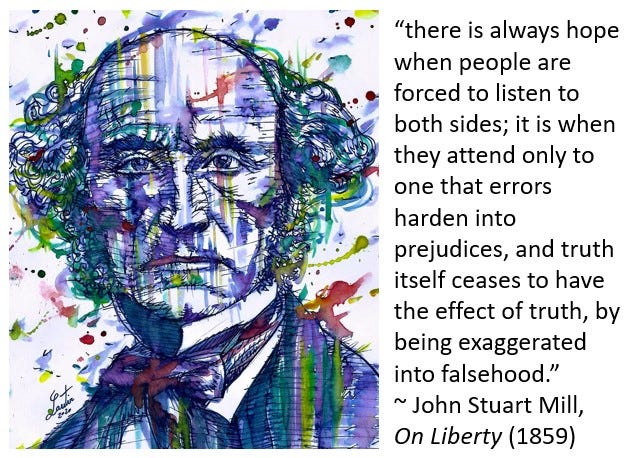
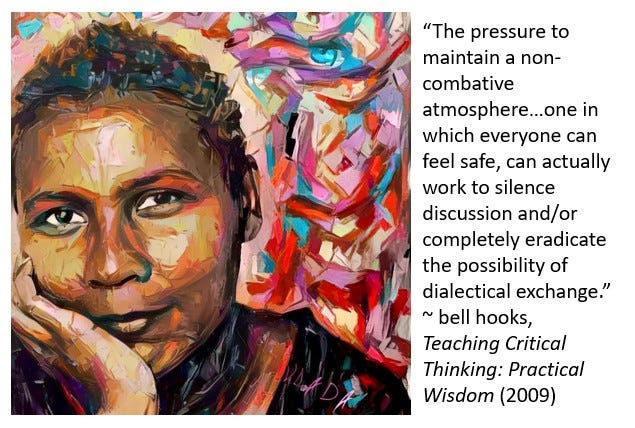

Having been a teacher and a parent, I agree emphatically with Fromm. To be prepared to deal with the current realities, students need to find ways to find what's real and not to jump to unsubstantiated conclusions. The necessary combination of facts and investigative thinking reveals acceptance of others and potential unity, not the divisive and dangerous culture we seem to see currently.
Lovely piece. I think Fromm's critique stands, however we have to decide what we want school to do: train people or teach them to think. You can't do both at the same time. Ideally, school would do both, but from what we're seeing - not well.